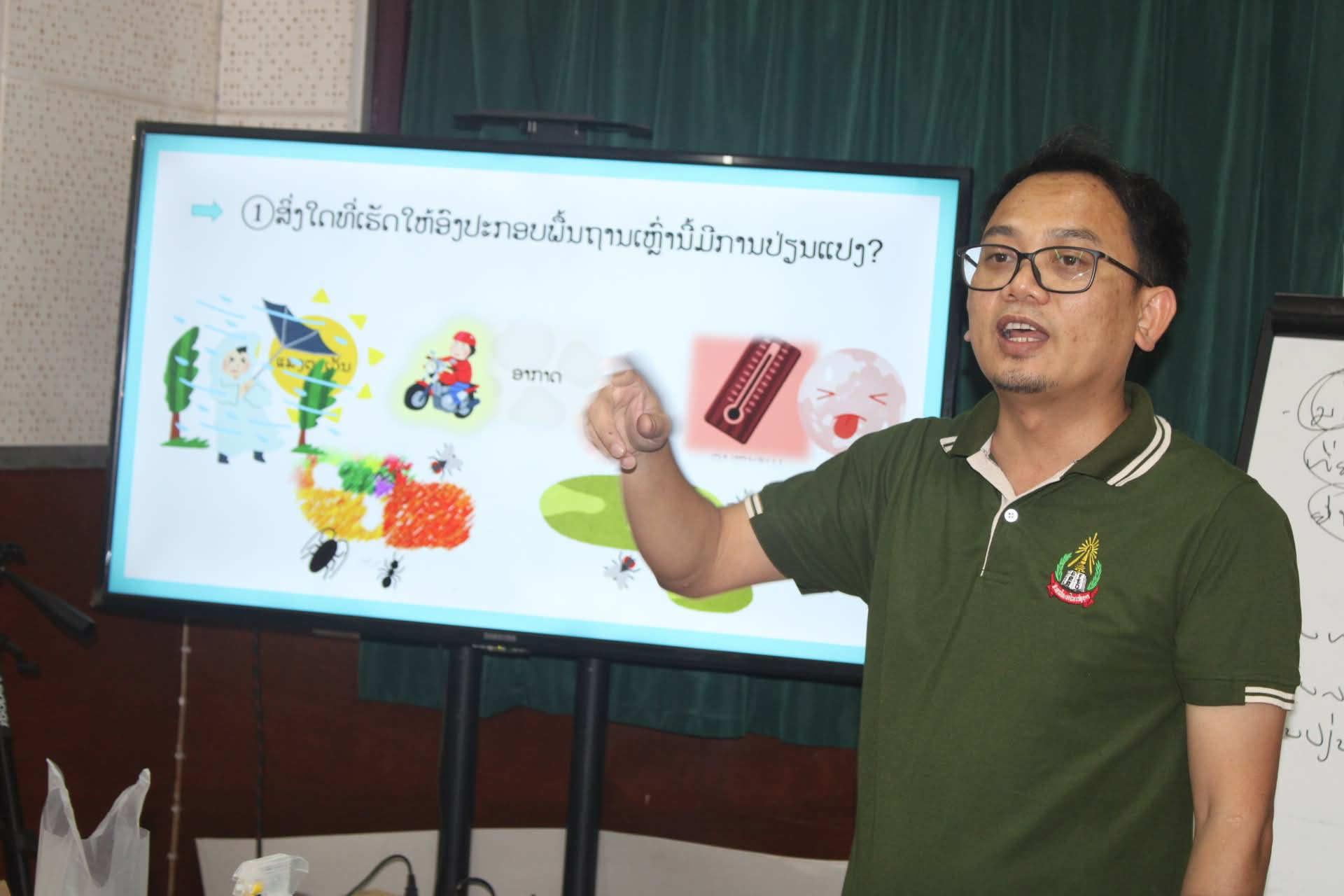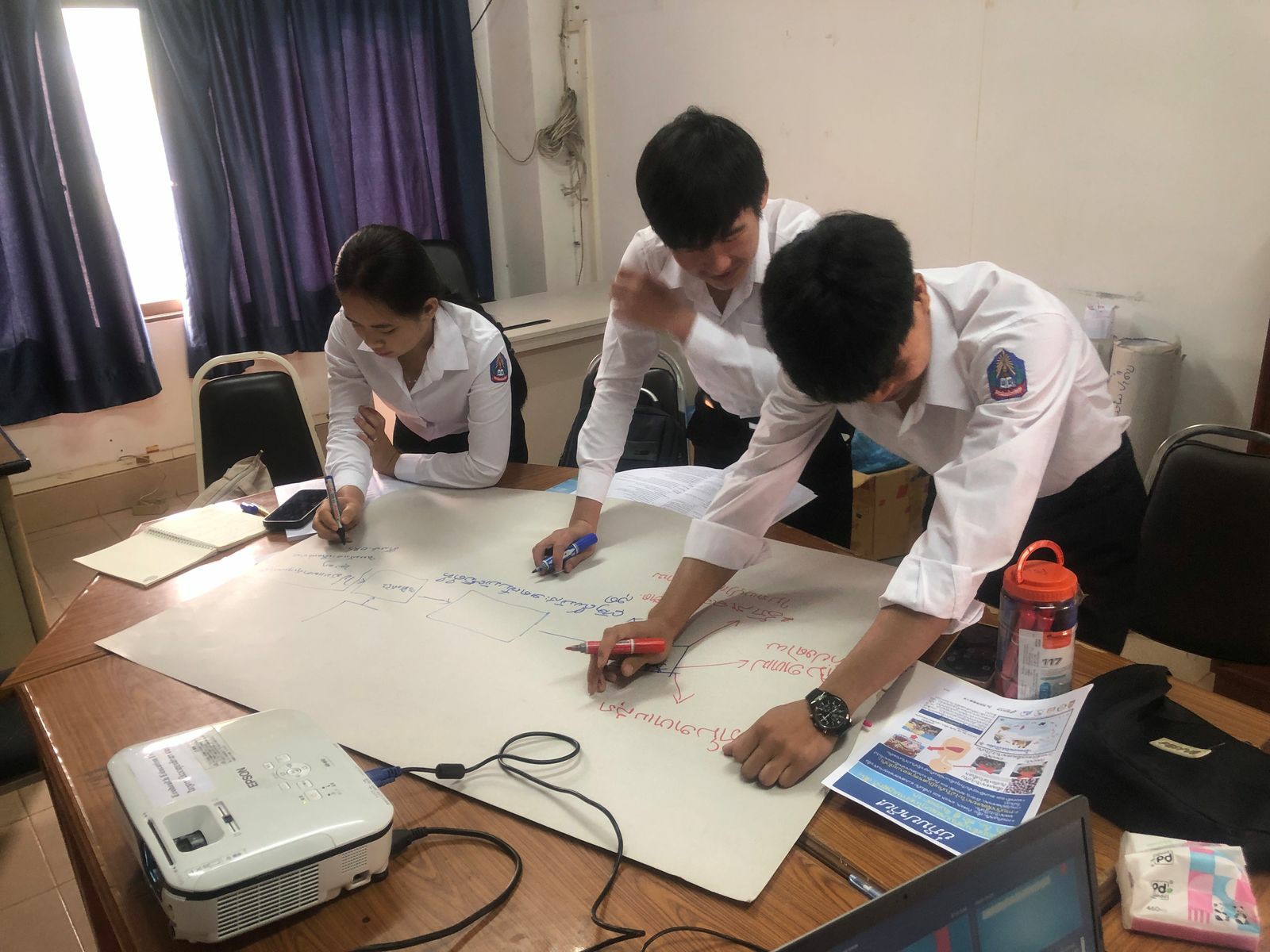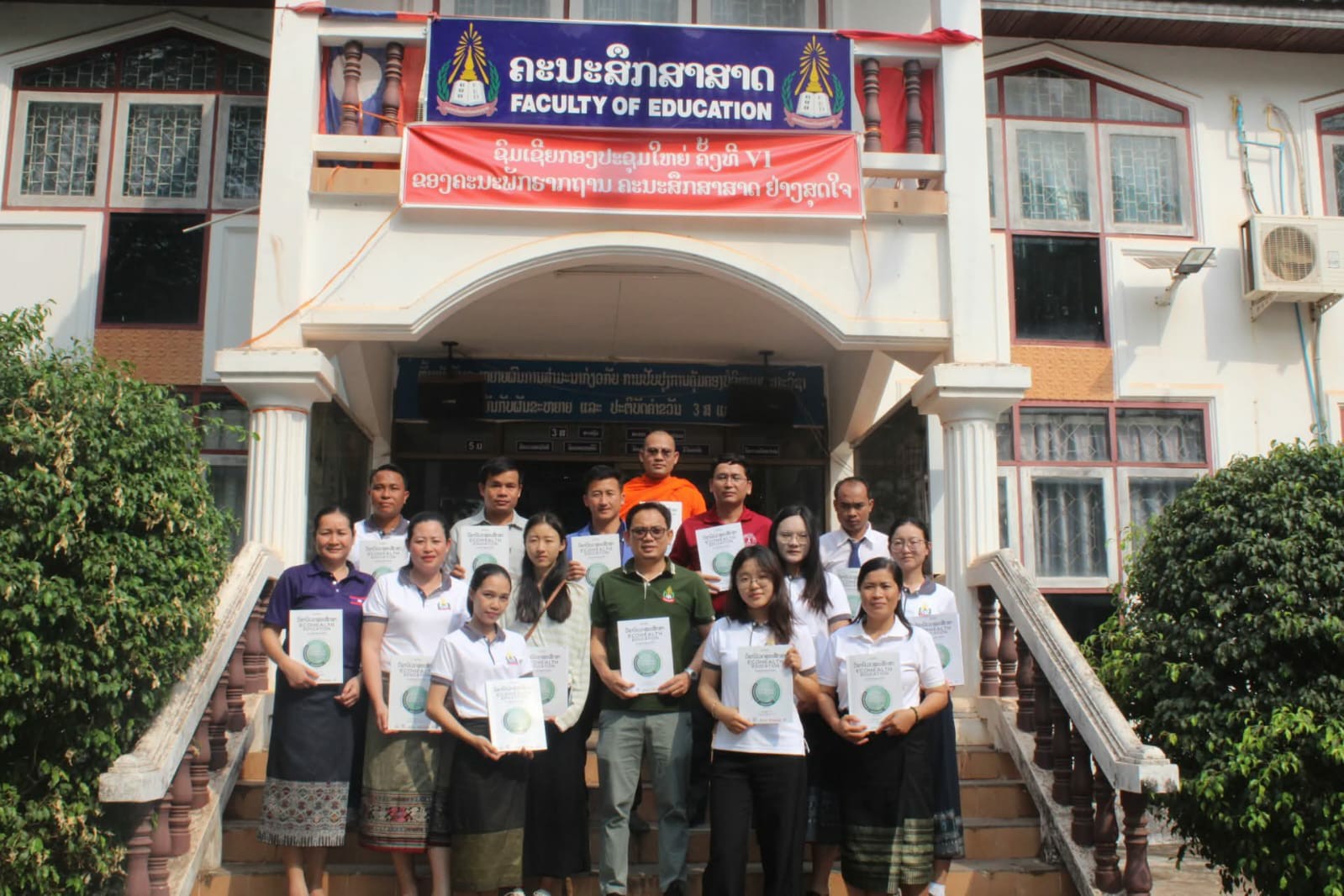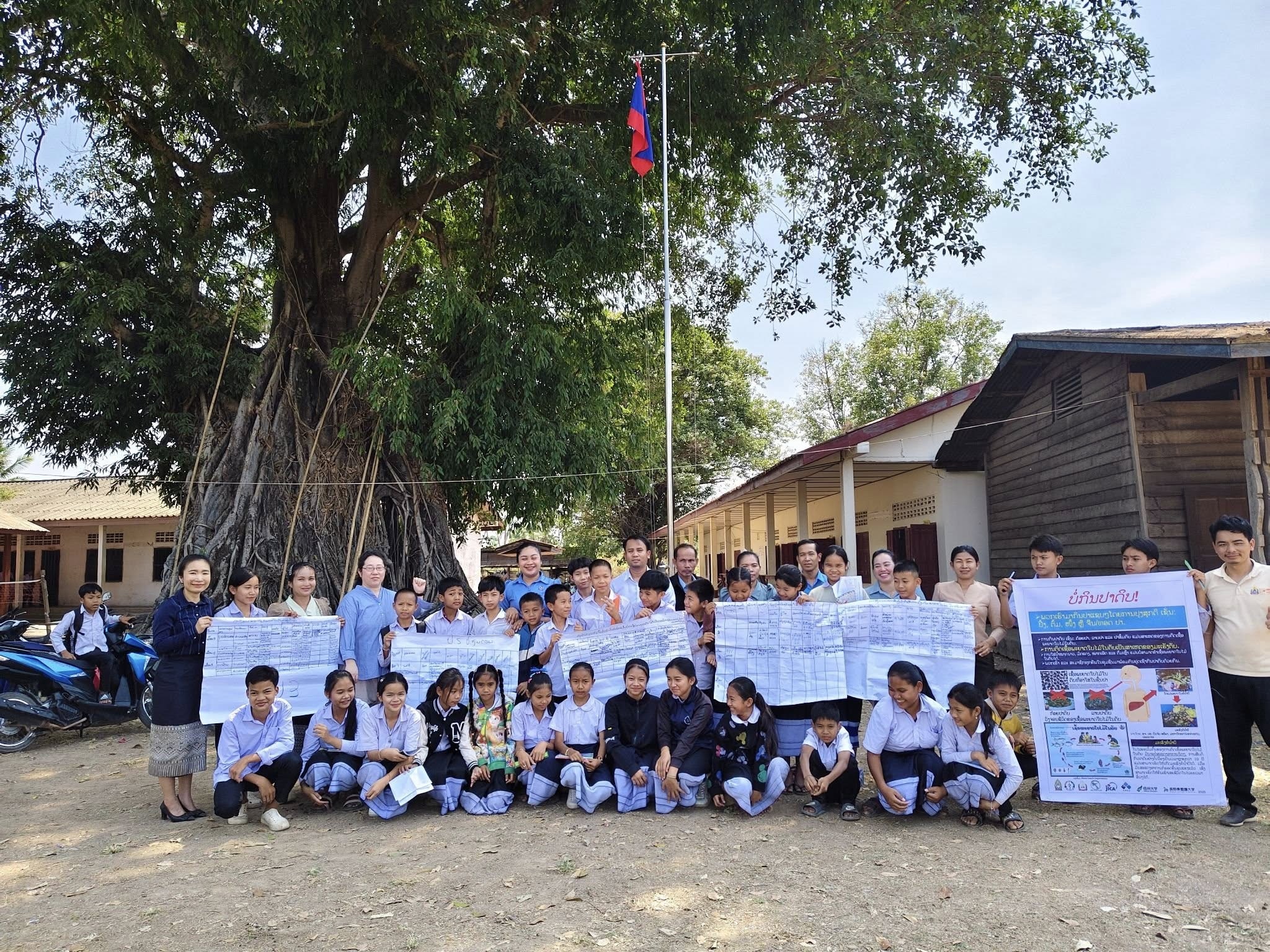In 2018 and 2019, Shinshu University implemented the EDU-Port Pilot Project ‘Enriching practice and research on Ecohealth education through introduction of Japanese style teacher training and research system’.
Ecohealth education is the Lao version of ESD (Education for Sustainable Development) developed through collaboration between the Faculty of Education in National University of Laos, the Ministry of Education and Sports and Japanese academic researchers.The aim of Ecohealth education is to raise young people who understand the changes to human lifestyles brought about by development, the effect these changes have on the environment, and the impact of this effect on human health (water and health; forests and health; global warming and health; social changes, mental health, etc.) and who are able to act taking both health and the environment into consideration.
Ecohealth education has six distinctive features;
1)Learning through ecosystem thinking
2)Interdisciplinary learning
3)Participatory learning
4)Global and regionally-rooted perspective
5)Practice in daily life
6)Education in gender issues and for the creation of an equitable society
In particular, Ecohealth education encourages the active participation of teachers and children in the learning, and promotes behavioral changes to address health and environmental issues by helping them understand cause-and-effect relationships and interrelationships through systems thinking. In addition, it is expected that the promotion of Ecohealth education will contribute to the improvement of teaching methods. In the pilot project, with the aim of promoting the spread of Ecohealth education we worked on the development of a teacher training system for teacher training institutions in Laos and for teachers at nearby schools, using the lesson-study method.
 A class on climate change and health
A class on climate change and health A group exercise in progress
A group exercise in progress Students holding their Ecohealth textbooks
Students holding their Ecohealth textbooks
As a result of the pilot project, following the Coronavirus pandemic, instruction in Ecohealth education is steadily expanding; from September 2025 it will be included as a compulsory subject at the Faculty of Education of the National University of Laos for students majoring in biology, psychology, school management, etc., as well as in recurrent courses for in-service teachers. As the number of people learning about Ecohealth education grows, we face the happy challenge of needing more people who can provide guidance to them.
From 2023, a joint research project (2023-2028) by SATREPS (Science and Technology Research Partnership) and JICA has been under way to control Opisthorchis viverrini and Schistosomiasis Mekongi, diseases that are endemic in South-Central and Southern Laos. In this research project, as an educational approach to parasite control, the Ministry of Health of Laos, the Ministry of Education and Sports and the National University of Laos are collaborating in carrying out practical research through the application of Ecohealth education. Liver fluke infection is spread when the feces of infected humans, dogs, cats and other animals are allowed to enter bodies of water, where the liver flukes live as a parasite in snails; the snails are then eaten by specific types of carp, which in turn are eaten raw by humans. Therefore, preventing infection requires not only a change in the habit of consuming raw fish, but also an Ecohealth educational approach involving the cooperation of local residents who will take the initiative in fighting the disease, including the use of toilets, management of livestock, etc. An outline of the project can be found at the following URL.
https://www.jica.go.jp/oda/project/202109819/index.html
However, for the people of Laos, the consumption of raw fish is more than just a dietary habit; it is an important activity that is deeply rooted in the local culture and society. In these regions, raw fish cuisine is not only eaten on a daily basis; it is also served on traditional occasions such as ceremonies and festivals, and has played a role in fostering bonds and a sense of community among the people. In economic terms too, raw fish is a valuable source of protein that is easily obtained from the Mekong River and its tributaries; and in rural areas especially, it is a daily staple that is cheaper and more familiar than meat. With storage options limited, the practice of eating fish immediately after catch took root naturally, resulting in the formation of a culture of eating food raw. Therefore, the consumption of raw fish is a part of life closely linked to the traditional, economic and nutritional aspects of the region, and when taking measures to combat health risks such as parasitic infections, it is essential that this cultural context and lifestyle be fully understood and valued. In addition, the formation of dietary and hygiene habits is greatly influenced by culture and family background, so that the formation of good habits needs to be worked on from an early age. For this reason, it is hoped that in cooperation with the people of Laos we will be able to promote infection control measures that bring out the best of the child’s own initiative, from the school to the community and from the community to the school.
However, when the science education textbook was revised in 2023, content relating to liver fluke infection, that had until then been included, was deleted. On the other hand, the Lao government recognizes the need to develop and disseminate regional curricula in order to raise children’s’ self-determination and motivation for learning through education based on region-specific issues and resources, and to nurture the future leaders of sustainable local communities while fostering love of one’s hometown and a sense of civic engagement.
Under these circumstances, as an exit strategy for the SATRAPS-JICA joint research project, new directions are emerging in the application of Ecohealth education toward the development of ‘regional curricula’. In this there is much that can be learned from the experience of Japan in developing and promoting ‘the Period for Integrated Studies’ and ‘Inquiry-Based Learning, IBL’; while at the same time the process of collecting various kinds of information from the Japanese educational system is bringing to light some issues in the Japanese ‘integrated study periods’. Japanese-style integrated study does not include that many initiatives on the theme of regional health and environmental issues, and there is a feeling that in the future as Japan and Laos learn from each other, Ecohealth education will be able to develop to the next stage. The fact that this is a problem that is unique to the southern part of Laos makes it worth tackling as one of the themes of the ‘regional curriculum’.
Through the EDU-Port pilot project, the foundation has been laid for teacher training to implement learner-centered Ecohealth education. In our ongoing research projects, we would like to make use of what has been learned through the EDU-port project to ensure the Ecohealth education developed in Laos can contribute to the materialization of these principles in the form of Laos’ first ‘regional curriculum’.








